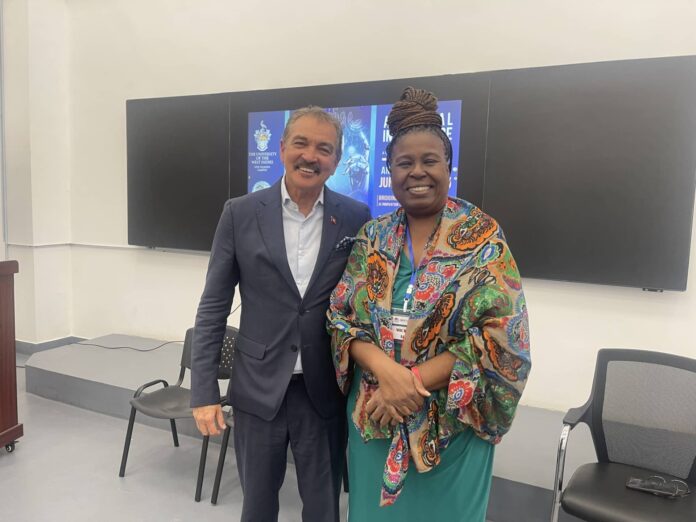As part of the ongoing UWI Five Islands Campus (FIC) Conference: AI for Caribbean Sustainability, regional tourism experts gathered for a dynamic panel discussion titled “Sustainable Tourism: Leveraging AI for Eco-Friendly and Resilient Travel Experiences.”
Featured speakers included the Hon. Charles Fernandez, Minister of Tourism for Antigua and Barbuda, and Dr. Michelle Allen, Senior Lecturer in Tourism Management at The University of the West Indies (UWI), Mona Campus.
Together, they addressed how artificial intelligence (AI) can drive sustainability, resilience, and innovation across Caribbean tourism.
Minister Fernandez emphasized that AI must be seen as a tool to enhance—not replace—human resources within the industry.
“Our people are our greatest asset. AI should support and elevate the service we deliver, making it smarter, more efficient, and even more personalized,” he stated.
He announced that Antigua and Barbuda is already exploring technical AI innovations, including a Virtual Reality (VR) tour experience tailored for travel agents as part of its marketing modernization.
He also highlighted the need for tourism stakeholders to retool and modernize operations using AI-driven solutions such as:
- Automated hotel and airline check-in systems
- Smart energy and building technologies
- AI-enhanced guest personalization and concierge services
“For a high-end destination like Antigua and Barbuda, the VIP product is especially pliable to AI interfacing,” the Minister noted.
“We must also prepare our workforce to adapt—now is the time for upskilling in AI.”
Dr. Michelle Allen centered her presentation on the practical applications of AI for building eco-friendly and resilient tourism models. She emphasized the power of advanced data analytics in shaping smart, climate-resilient policies and practices.
“AI can help us not only optimize experiences, but also support long-term sustainability through intelligent systems,” she explained.
Dr. Allen showcased a range of AI-powered smart tourism solutions, including:
- Smart hotels that promote sustainable hospitality practices
- AI-driven waste management and reduction technologies
- Neural network applications in transportation optimization
- AI-powered environmental conservation and ecosystem monitoring
She also reinforced the urgent need for climate change adaptation in Caribbean tourism, noting that AI offers the ability to identify and engage priority policy actors through data-driven decision-making and predictive modeling.
“As we face rising climate threats, AI provides the intelligence and foresight needed to protect our destinations, livelihoods, and natural heritage,” Dr. Allen said.
The panel discussion served as a cornerstone of the UWI FIC Conference, which explores how artificial intelligence can accelerate sustainable development across critical sectors in the Caribbean.
It concluded with a shared call for regional collaboration, strategic investment in AI tools, and a people-first approach to digital transformation in tourism.


